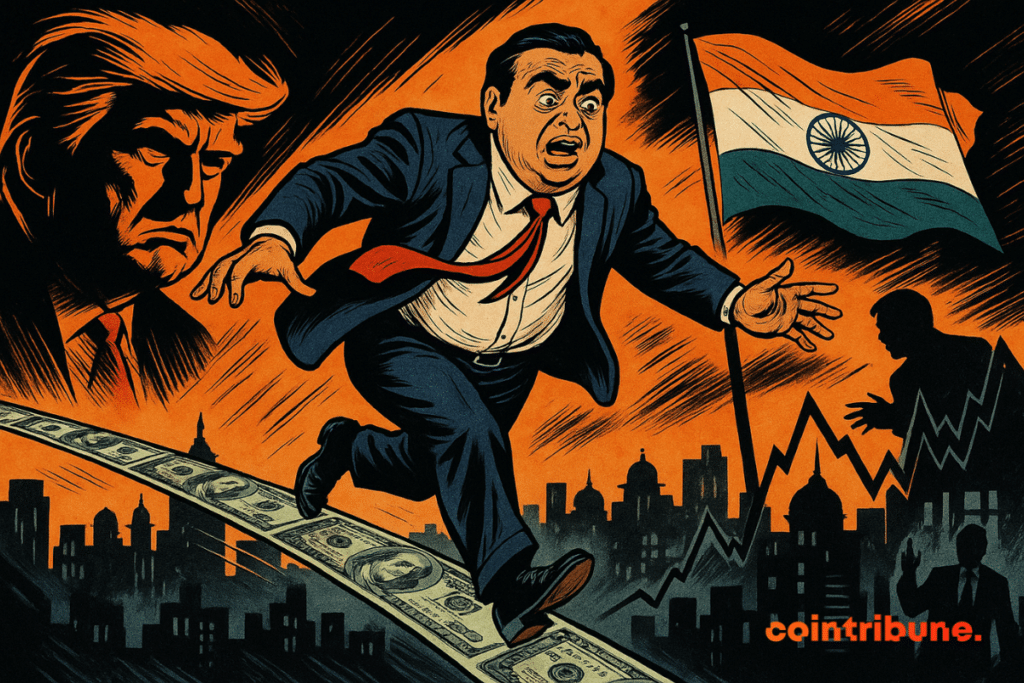Mukesh Ambani, India’s Richest Man, Gets Caught in Trump’s Trade War Crossfire
Trade tensions just snagged an unlikely victim—Asia's wealthiest tycoon.
The Tariff Trap
Trump's latest protectionist moves slammed Reliance Industries with $2.3 billion in unexpected duties. Ambani's refining empire—which processes nearly 1.4 million barrels daily—got hammered by sudden export restrictions. Supply chains snapped, margins compressed, and analysts watched $18 billion evaporate from market cap in three trading sessions.
Digital Pivot Meets Physical Barriers
Even Reliance's aggressive digital transformation couldn't firewall against analog trade policies. Jio's 5G rollout now faces component delays thanks to semiconductor export controls. The conglomerate's renewable energy push? Stalled by solar panel tariffs. Sometimes legacy economics trump digital disruption—literally.
Finance's Ironic Punchline
Wall Street's still placing bullish calls while short sellers circle. Because nothing says 'investment opportunity' like watching a billionaire play regulatory whack-a-mole. The street's taking bets on whether Ambani will lobby harder or just acquire a small country for tariff-free manufacturing.

In brief
- Mukesh Ambani signed a 10-year contract with Rosneft for Russian oil.
- Trump accuses Ambani of economic arbitrage by reselling refined oil to Europe.
- Reliance represents the Indian economy but suffers a trade war led by Trump.
- Washington doubled tariffs on Indian energy product imports.
When Ambani embodies patriotic capitalism in India’s forge
Mukesh Ambani, author of a crypto project on Polygon, is not an outsider. He embodies a winning national economy, pillar of Modi’s project. Reliance, its refineries, its omnipresence in distribution and telecom: everything aligns with the dream of a powerful India. Yet, Trump decided that this dream was suspicious, claiming that Indian conglomerates, including Reliance, profited from the war.
Advisor Peter Navarro and Treasury Secretary Scott Bessent did not mince words, denouncing “politically connected energy titans” profiting from the war. And Ambani is targeted.
According to Kpler, between January and June 2025, 141.57 million barrels of Russian crude were imported by Reliance via a ten-year contract with Rosneft. Economic necessity obliges, Trump responds with doubled tariffs of 50% on this oil.
Ambani has become a symbol of an awkward private-public rapprochement in today’s geopolitical game.
Oil arbitrage: $16 billion in profits… and a thunderclap in the global economy
The word hits hard: $16 billion of “excess profits” — according to Bessent — were amassed thanks to the purchase of discounted Russian oil, resold as refined product on the global market. Reliance, assisted by Nayara Energy, exported $60 billion of petroleum products in 2024-2025, including $15 billion to the European Union in just six months.
Reliance paid an average of $71.47 per barrel for Russian oil, against $75.5 for Saudi Arabia: a $4 saving per barrel on refines; just in Q1-Q2 2025, that represents a considerable margin. It is this logic of “Indian arbitrage” that Trump condemned, accusing these profiteers of pulling the strings of an economy in full geopolitical chaos.
Ambani was not off the radar after all: the Indian government gave no official response, but a close source ensures that behind the scenes these accusations are seen as “political theater.” Reliance intends to continue diversifying its supplies while playing it tight.
Global ambitions put to the test by economic diplomacy… and Trump
Reliance is not only petrochemicals: it invests in retail, telecom (Jio), tech. Meta is already a partner in its digital branch. But today, these global ambitions face tension with the United States. Ambani has few assets overseas, apart from a stake in the Mandarin Oriental in New York.
Yet, implicit threats of financial sanctions or restrictions on access to American markets hover. And in the geopolitical duel, Ambani does not have the weight of China, which remains largely unsanctioned despite its higher volumes of Russian imports.
Key facts:
- Reliance imported nearly 142 million barrels from Russia in six months;
- 36% of India’s oil needs come from Russia in 2025 (almost zero in 2022);
- Oil exports (RIL + Nayara): $60 billion, including 25% to the EU;
- Average Russian crude price: $71.47/b; Saudi: $75.5/b;
- Tariffs imposed by Trump: up to 50%.
Ambani could emerge politically and financially weakened. India’s “economy” (a pro-CBDC country) depends on diplomatic diversification, but this trade war led by Trump shakes the very pillars of an Indian model centered around private giants with close ties to the State.
On the Musk and Trump front, the story is now old. Musk was ready to challenge the system by creating an “America Party,” apparently sacrificed on the altar of pragmatism and politics. He accepted to temporarily give up his political party project, preferring to preserve his activities and ties — notably with JD Vance — rather than confront Trump head-on.
Maximize your Cointribune experience with our "Read to Earn" program! For every article you read, earn points and access exclusive rewards. Sign up now and start earning benefits.

